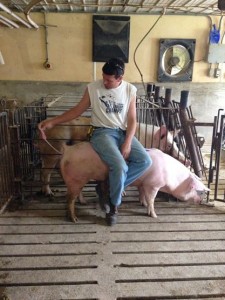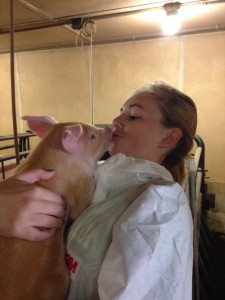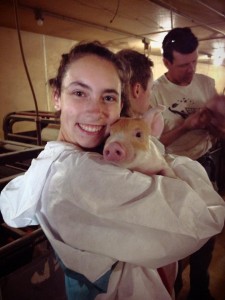We began today working on a CSA farm called Table Top Farms, owned by Luke and Sally Gran. They were such pleasant people. I really enjoyed working with them, although I wish we spent more time working and less time standing around and talking. I feel like by now a lot of the basics of farming is repeated, and I would rather get into the nitty gritty details. Plus, it was early and kind of chilly. I did learn a lot from them, however. For example, it was the first time I had heard about alfalfa and oats, the so-called third rotation crops. I personally think that more farmers should alternate between corn, soybeans, and the alfalfa/oats combination since they would all bring in a profit while maintaining the soil. It’s not like farmers are ever going to not need alfalfa and oats for their livestock. This would also lead to a smaller (even if only minimally) supply of corn, leading to higher prices.
Next, we went to a protest against GMOs, advertised as “March Against Monsanto.” It was more of a public gathering about the benefits of organic food and the negative consequences of things like GMOs and chemicals, though. It was fun. It was nice to be able to listen to someone without them asking my thoughts since my thoughts on the topic are still developing. The animals, of course, were my favorite part. The urban garden that we went to was really cool, too, though. I didn’t even know there was an option for people to farm unless they had room on their own land. It was clear that people really cared for their plots. At $25 for a plot for a season, it seems like a great price, since water is included. My mom would love something like that.
After that, we went to see the movie Fed Up, which was about the “epidemic” of obesity in America. It had some good points, but I really do not agree with the documentary makers’ suggestions for combating obesity. I realize that America has an obesity problem, but I do not believe it is something in which the government needs to be heavily involved. For example, when the interviewer was interviewing the woman about what Coca-Cola is doing to help, she kept insinuating that they should take existing Coke products off of the shelf. I do not think that that is reasonable. If people want to drink coke, there is no reason why they shouldn’t have that option. The greatest aspect of our capitalist society is the multitude of choices we have. The government is overstepping its limits when it begins to regulate what can and cannot be sold to the public, especially something like a drink. If the government begins to regulate what we can and can’t eat, what we can and can’t drink, where does it stop?
Further, they made it seem like the food industry is wholly responsible for the obesity problem and that exercise and personal responsibility doesn’t play in at all. This I completely disagree with. Yes, the unhealthy options are out there and, yes, there are very influential advertisements, but there are healthy options as well. No one is forcing anyone into eating the foods that lead to obesity or hinder weight loss. Especially if there is a young child who is severely overweight, I believe that the responsibility falls on the parent. It is their job to keep their kids safe and healthy, so if they see that they are starting to get too heavy they should reduce their unhealthy food intake and encourage more exercise. I have eaten fast food and drank soda my entire life while managing to stay a healthy weight, even under weight at times. I attribute this to my highly active lifestyle, but one could argue that it is because I’m hypoglycemic. To that I would tell them to look at my brother. He is healthy, eats nothing but junk, and weighs barely 140 pounds at six foot tall. People need to start taking responsibility for their own health and quit blaming everyone else.
One of the movie’s main arguments was the comparison between unhealthy food and cigarettes. While I do see the connection, I think it is exaggerated. Cigarettes are not only a hazard for those who smoke them but to everyone around the smoker due to secondhand smoke. Unhealthy food only affects the person eating it, so there is no reason to regulate it like cigarettes. Putting health warnings on unhealthy food, however, is a good suggestion. For example, coke bottles could have a warning saying “could lead to obesity, heart disease, diabetes, and cancer.” Further, at least in South Carolina, all schools have a salad option every day, and it is not the school’s fault if the children do not choose it. Having only healthy options is great in theory but not practical. Chain restaurants like Papa Johns offers discounts to schools, making it a cheaper option. Changing the food would make it more expensive to students and many students that I know, who do not currently qualify for free lunch, would not be able to afford it. Again, its good to have options.
The movie also claimed that eating unhealthy is an addiction. I can understand that. However, just because there are alcoholics, we do not ban the production, sale, and advertisement of it. We send the alcoholics to rehab so they can get help. Perhaps we should develop obesity rehabs where those who suffer from obesity, children to adults, can go where unhealthy options are not available to them without restricting everyone else. While unhealthy eating may be an addiction similar to alcoholism, it doesn’t mean that everyone cannot control themselves.
What really bothers me is that obesity gets a lot of attention while eating disorders do not and are still even stigmatized. For every obese person I know, I know at least one person who has suffered or currently suffers from some kind of eating disorder. The constant media attention on the importance of being thin only strengthens these disorders that are just as deadly, if not more, than obesity. According to the National Association of Anorexia Nervosa and Associated Disorders (ANAD), up to 24 million people in the US suffer from some sort of eating disorder. Even more disturbing is the fact that 81% of ten year olds are afraid of being fat. Has it not occurred to anyone that the emphasis on not being fat is directly related to the prevalence of eating disorders? All in all, I thought the movie cherry picked a lot of data and information to focus on one specific problem while ignoring the big picture.




















